@mythfish
个人没实际用过 T113 EMAC
但是做过其他平台,基本上都是调整时钟参考源
如果你没有上看你的 PHY/SWTICH 本身有没有输出
没有的话就是使用自己内部
Allwinner 的T113-S3 文件也是这样写的
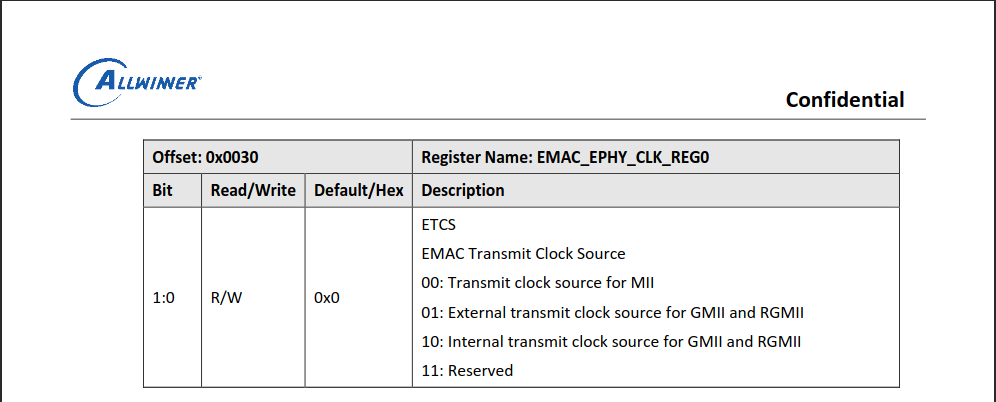
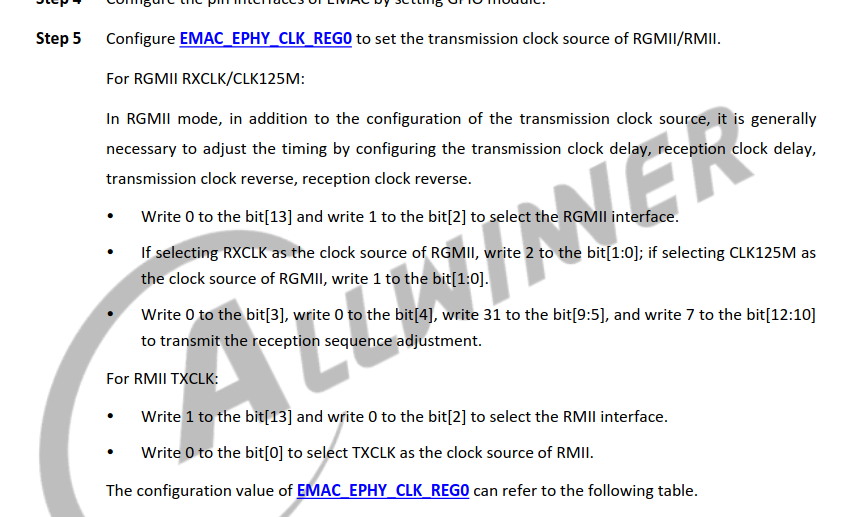
@mythfish
个人没实际用过 T113 EMAC
但是做过其他平台,基本上都是调整时钟参考源
如果你没有上看你的 PHY/SWTICH 本身有没有输出
没有的话就是使用自己内部
Allwinner 的T113-S3 文件也是这样写的


就Bootrom 初始化硬件透过USB与PC主机透过定义好的命令上传程序到SRAM,然后SRAM上的程序进行DRAM 初始,然后继续上传程序到DRAM 就好像可以直接跑一个U-Boot 之后你要做啥就做啥,都有一些开源被大神实做出来
底下是参考资料
@laizh950 在 如何对arp广播风暴进行规避? 中说:
将普通交换机的两个网口短接,制造出arp广播风暴,只要出现arp广播风暴后,linux的软中断的CPU占用率就会很高,主要表现就是其他主要任务不能及时运行,甚至不运行,同时也无法和上位机联通。
试试
ip link set eth0 multicast off
ip link set eth0 promisc off
or
iptables -A INPUT -m pkttype --pkt-type broadcast -j DROP
iptables -A INPUT -m pkttype --pkt-type multicast -j DROP
STP/RSTP 是 L2 switch 本身功能
Okay, Maybe you can try the below code
#include <stdio.h>
#include <fcntl.h>
#include <errno.h>
#include <termios.h>
#include <unistd.h>
#include <sys/ioctl.h>
#include <linux/serial.h>
#include <string.h>
int main(int argc, char *argv[]) {
// Open serial port ttyS1
const char *device = "/dev/ttyS1";
int fd = open(device, O_RDWR | O_NOCTTY);
if (fd < 0) {
perror("Error opening serial port");
return -1;
}
// Get the current serial port settings
struct termios tty;
if (tcgetattr(fd, &tty) < 0) {
perror("Error getting port attributes");
close(fd);
return -1;
}
// Configure the serial port settings
// Clear all settings first
tty.c_cflag = 0;
tty.c_iflag = 0;
// Enable receiver, ignore modem control lines
tty.c_cflag |= CREAD | CLOCAL;
// Enable hardware flow control (RTS/CTS)
tty.c_cflag |= CRTSCTS;
// Set baud rate to 19200
cfsetispeed(&tty, B19200);
cfsetospeed(&tty, B19200);
// Set 7 bits per byte
tty.c_cflag |= CS7;
// Enable even parity bit, without PARODD
tty.c_cflag |= PARENB;
// Set 2 stop bits
tty.c_cflag |= CSTOPB;
// Apply the new settings
if (tcsetattr(fd, TCSANOW, &tty) < 0) {
perror("Error setting port attributes");
close(fd);
return -1;
}
printf("Serial port configured successfully\n");
printf("Port configuration:\n");
printf("- Device: %s\n", device);
printf("- Baud rate: 19200\n");
printf("- Data bits: 7\n");
printf("- Parity: Even\n");
printf("- Stop bits: 2\n");
printf("- Flow control: RTS/CTS\n");
// Test string to send
const char *test_string = "Hello! This is UART1\n";
ssize_t bytes_written = write(fd, test_string, strlen(test_string));
if (bytes_written < 0) {
perror("Error writing to serial port");
} else {
printf("\nSent %zd bytes: %s", bytes_written, test_string);
}
// Keep the port open briefly to ensure transmission
sleep(1);
// Close the serial port
close(fd);
return 0;
}
check device tree first, check uart1_pins_a with RTS/CTS pin control
pinctrl-0 = <&uart1_pins_a>;
不要用Cmd 這沒法支持
用Putty Tray 試試
或是 PowerShell
另外還有Cmder
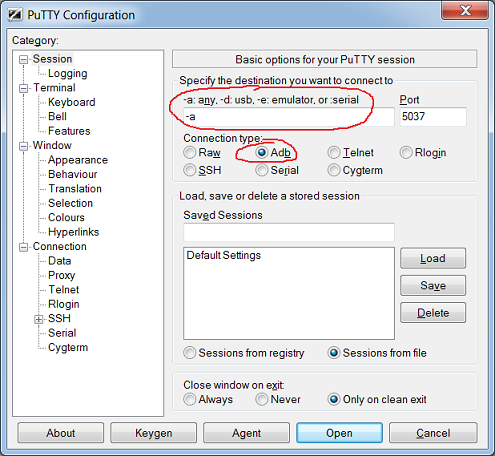
@b18770205274
不是喔
你的語法是 send_fd > 0 就會執行 printf("open error\n"); exit(EXIT_FAILURE);
要 if ((send_fd < 0) || (receive_fd < 0))這樣才是你說的意思
就dts 可能有問題
如果你都確定其他版本可以正確
表示在那個版本的軟硬件設定正確
那事情就簡單了 就是Android 12 設定不正確
我也不是原廠的工程師
只是說明訊息產生的原因
言盡於此
@gwx123
電壓要能支持1.8V and 3.3V切換才行支持 SDIO 3.0
不然就吐那個說你的卡需要更低電壓
沒試過不過看起來這段代碼有bugs
應該 if() else break; 讀到後就離開 while()
@ary_ye 在 Ubuntu18.04配置livesuit环境时报错insmod: ERROR: could not insert module awusb.ko: Invalid module format 中说:
linxiaoyan@WP:~/sunxi-livesuite-master/awusb$ modinfo ./awusb.ko filename: /home/linxiaoyan/sunxi-livesuite-master/awusb/./awusb.ko license: GPL description: AW USB driver author: Jojo srcversion: E085DDDF9EB284306C544FA alias: usb:v1F3ApEFE8d*dc*dsc*dp*ic*isc*ip*in* depends: retpoline: Y name: awusb vermagic: 5.15.0-41-generic SMP mod_unload modversions linxiaoyan@WP:~/sunxi-livesuite-master/awusb$ uname -r 5.15.0-41-generic linxiaoyan@WP:~/sunxi-livesuite-master/awusb$ sudo insmod ./awusb.ko [sudo] linxiaoyan 的密码: insmod: ERROR: could not insert module ./awusb.ko: Invalid module format linxiaoyan@WP:~/sunxi-livesuite-master/awusb$内核版本对的上,livesuit上说重新安装dkms我也照做了,还是用不了,奇怪了
這樣我就也搞不懂了,我遇過的是版本對不上,livesuit 上的Makefile & dkms.conf 有問題
當系統kernel 升級的時候,它dkms 可能在前一個版本執行,uname -r 會有問題
要修改,我回答你問題的時候就發現我用5.15.0-116-generic 但是它會變成用5.15.0-113-generic
重新編譯才正常
你的系統有沒有開Secure Boot? 有的話只能用dkms 去編譯跟簽名
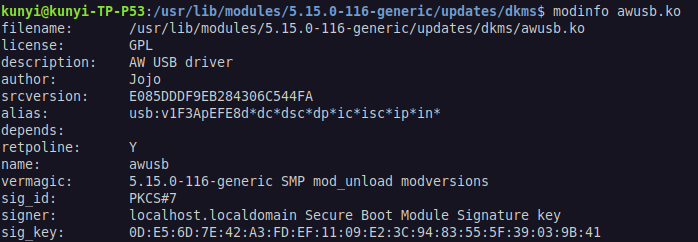
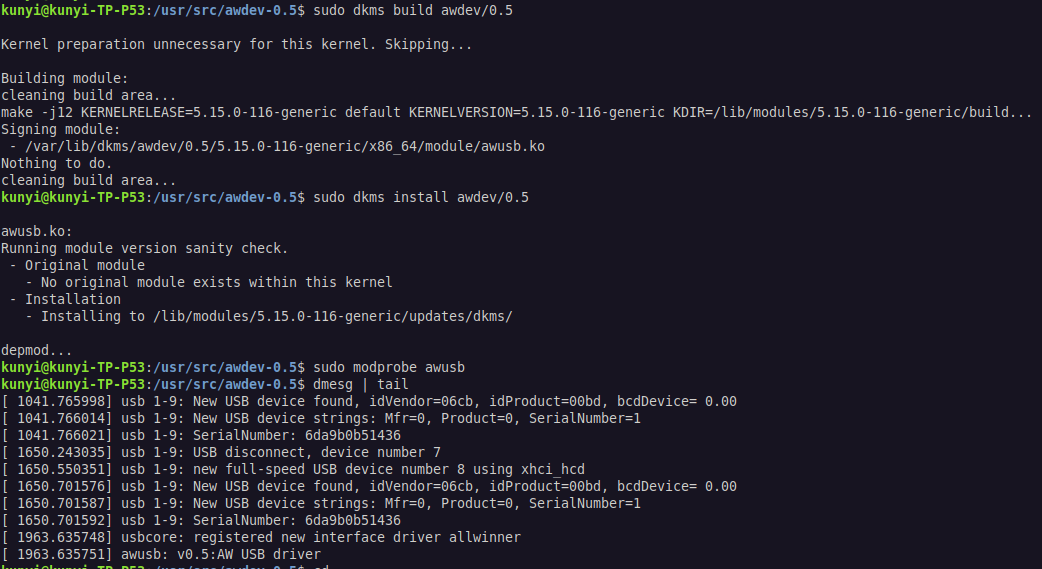
下面是我改過得 Makefile & dkms.conf
Makefile
code_text
obj-m := awusb.o
KDIR ?= /lib/modules/$(shell uname -r)/build
PWD := $(shell pwd)
default:
$(MAKE) -C $(KDIR) M=$(PWD) modules
clean:
$(MAKE) -C $(KDIR) M=$(PWD) clean
rm -rf Module.markers module.order module.sysvers
dkms.conf
code_text
PACKAGE_NAME="awdev"
PACKAGE_VERSION="0.5"
CLEAN="make clean"
MAKE[0]="make default KERNELVERSION=$kernelver KDIR=/lib/modules/$kernelver/build"
BUILT_MODULE_NAME[0]="awusb"
DEST_MODULE_LOCATION[0]="/updates"
AUTOINSTALL="yes"
@ary_ye
一般是linux kernel header 版本跟你正在使用的kernel 版本不同
用 modinfo 檢查編譯出來的 awusb.ko
我用Docker 裝 ubuntu 20.04
安裝下面 package 可以正常build core and full 版本
RUN dpkg --add-architecture i386 && \
apt-get update && \
apt-get install -y locales && \
localedef -i en_US -c -f UTF-8 -A /usr/share/locale/locale.alias en_US.UTF-8
ENV LANG en_US.UTF-8
RUN apt-get install --no-install-recommends --no-install-suggests --yes \
build-essential ca-certificates gcc gcc-multilib clang curl \
git git-lfs gnupg gperf build-essential zip libc6-dev python \
x11proto-core-dev libgl1-mesa-dev g++-multilib tofrodos zlib1g-dev \
libncurses5-dev:i386 libx11-dev:i386 libreadline6-dev:i386 \
libgl1-mesa-glx:i386 zlib1g-dev:i386 linux-libc-dev:i386 gawk \
libncurses5-dev bc bison flex gettext libssl-dev autoconf libtool \
wget patch dos2unix tree u-boot-tools libelf-dev libncurses5 \
libxml2-utils xsltproc markdown texinfo gettext busybox \
fakeroot cpio unzip rsync ccache xxd vim liblzo2-2 && \
apt-get clean && \
rm -rf /var/lib/apt/* /var/cache/apt/* /tmp/* /var/tmp/*
後面是完整的 Dockerfile 還有怎樣build docker image 跟進入docker環境用的shell script
進 container 後
直接 ./build.sh config && ./build.sh 即可
文件講的環境變數
只需要
export ARCH=arm64
export CROSS_COMPILE=aarch64-none-linux-gnu-
用我的Dockerfile 已經寫在裡面了
加上其他會產生類似你的錯誤
entrycontainer
build-container
Dockerfile
基本上PMIC只是保證時序要求,你如果用獨立的DC/DC 可以完成時序要求沒有不行的
對H616本身來說它不關心外部器件實質為何,只關心是否吻合時序,電壓/電流等條件是否能滿足
當然如果你需要動態調整電壓功能的話那對應的DC/DC 也需要有對應的驅動程序
@skrlou 在 有没有搞过蓝牙wifi模块 RF测试的啊 中说:
我是想问下有没有搞过这个的别的模块也可以 反正都是要厂商提供模块相对应的测试软件来搞 是想问下这个过程
就是搞過才跟你說就是按文件做
要看你的toolchain 编译出wifi_test,bt_test
然後 也要在你現在用的kernel 下編譯出文檔說的aic8800_fdrv.ko
看是廠商給你的東西怎樣去修改放到kernel 或是直接可以用ext modules
編譯的方法
ref https://docs.kernel.org/kbuild/modules.html
其他就是按文檔說給測試實驗室使用
@westwhale
在
全志芯片Tina Linux 修改 UART 引脚、UART端口
https://bbs.aw-ol.com/topic/1673
修改启动bootargs
有這個
你有做嗎?
這個決定linux 的console
@xjy_5 如果你用原廠camera 那不關閉ISP的情況下會出錯嗎?
先找一個會動的案例出來
之後基於這個基礎去理解跟修改會不會好一點?
@xjy_5
沒實際做過
不過看你的log 你可以看到是有呼叫到 驅動的但是 image pipeline 建立失敗
你仔細研究看看 應該有機會的
I0101 03:45:59.705919 1128 alsa_interface.c:736] <alsaOpenMixer> alsa_elem:MIC2 In[ 32.135476] [tc358743_mipi]sensor_power
put Select
I0101 03:45:59.70604[ 32.142119] [tc358743_mipi]PWR_ON!
1 1128 alsa_interface.c:736] <alsaOpenMixer> alsa_elem:MIC2 gain volume
I0101 03:45:59.706113 1128 alsa_interface.c:736] <alsaOpenMixer> alsa_elem:SPK
I0101 03:45:59.706173 1128 alsa_interface.c:736] <alsaOpenMixer> alsa_elem:digital volume
I0101 03:45:59.706228 1128 alsa_interface.c:736] <alsaOpenMixer> alsa_elem:rx sync mode
I0101 03:45:59.706281 1128 alsa_interface.c:736] <alsaOpenMixer> alsa_elem:tx hub mode
I0101 03:45:59.712543 1128 sample_virvi.c:633] <initSaveB[ 32.193321] [tc358743_mipi]sensor_init
ufMgr> node[0] alloc data len[3110400] phy addr[1221591040] vir addr[0xb6966000]
I0101 03:45:59.719106 1128 sample_virvi.c:633] <initSaveBufMgr> node[1] alloc data len[3110400] phy addr[1224736768] vir addr[0xb666e000]
I0101 03:45:59.725542 1128 sample_virvi.c:633] <initSaveBufMgr> node[2] alloc data len[3110400] phy addr[1227882496] vir addr[0xb6376000]
I0101 03:45:59.731885 1128 sample_virvi.c:633] <initSaveBufMgr> node[3] alloc data len[3110400] phy addr[1231028224] vir addr[0xb607e000]
I0101 03:45:59.738354 1128 sample_virvi.c:633] <initSaveBufMgr> node[4] alloc data len[3110400] phy addr[1234173952] vir addr[0xb5d86000]
[ISP]video device name is vin_video0
[ISP]open video device[0], detect isp0 success!
I0101 03:45:59.739078 1128 media_debug.c:45] <getDictByConfPath> MPP_DEDIA_DEBUG_FILE_PATH=(null)
I0101 03:45:59.739625 1128 videoInputHw.c:1015] <videoInputHw_SetChnAttr> ViCh[0], user set disable Encpp
[ 32.375465] v4l2_dev:ddc438b8
[ 32.379612] [TC358743]tc358743 chipid:0x0
[ISP]video0 fd[14] ve_online_en=[ 32.384193] [VIN]ve_online close
0, dma_buf_num=0
[ 32.391026] [VIN_ERR]vin is not support this pixelformat
[ 32.398110] [VIN_ERR]vin_pipeline_try_format failed
[ISP_ERR]video_set_fmt, line: 194,VIDIOC_S_FMT error!
E0101 03:[ 32.406800] [tc358743_mipi]sensor_ioctl cmd:-1069787396
46:00.008377 1128 videoInputHw.c:1055] <videoInputHw_SetChnAttr> video set_fmt failed, chn[0]
E0101 03:46:00.008512 1128 sample_virvi.c:758] <prepare> fatal error! vi dev[0] set vipp attr fail!
[ISP]open isp device[0] success!
[ISP_ERR]isp_sensor_get_configs, line: 810,tc358743_mipi get config failed: Invalid argument (22).
[ISP_WARN]open /mnt/extsd/isp0_0_0_0_ctx_saved.bin failed, err:No such file or directory.
[ISP]prefer isp config: [tc358743_mipi], 0x0, 0, 0, 0
[ISP_WARN]cannot find tc358743_mipi_0_0_0_0_0 isp config, use gc2053_mipi_1920_1088_20_0_0 -> [gc2053_mipi_isp600_20220511_164617_vlc4_day]
[ISP_ERR]isp_ctx_config_init, line: 2305,sensor attribute is not init.
[ISP]create isp0 server thread!
planes number is error!
記得你的 ISP 要trun off
ref.https://zhuanlan.zhihu.com/p/628496408
@mysteryli
check the https://docs.docker.com/engine/install/linux-postinstall/
for non-root user with docker
@zny666
Which filesystem fat or ext4 on SDCARD?
maybe try copy ./tmp3 on ext4 filesystem to verify again,
cp -vf tmp3 /tmp && chmod a+x /tmp/tmp3 && /tmp/tmp3
@zny666
first try
chmod a+x ./tmp3
then run
sudo ./tmp3
想请教一下LiveSuite 现在在Linux 上面刷固件有啥要注意的没有
不知道为啥进了FEL mode 后, LiveSuite 只会提示是否要格式化 然后就没反应了
用dmesg 會出現 task timeout 如下面兩張圖
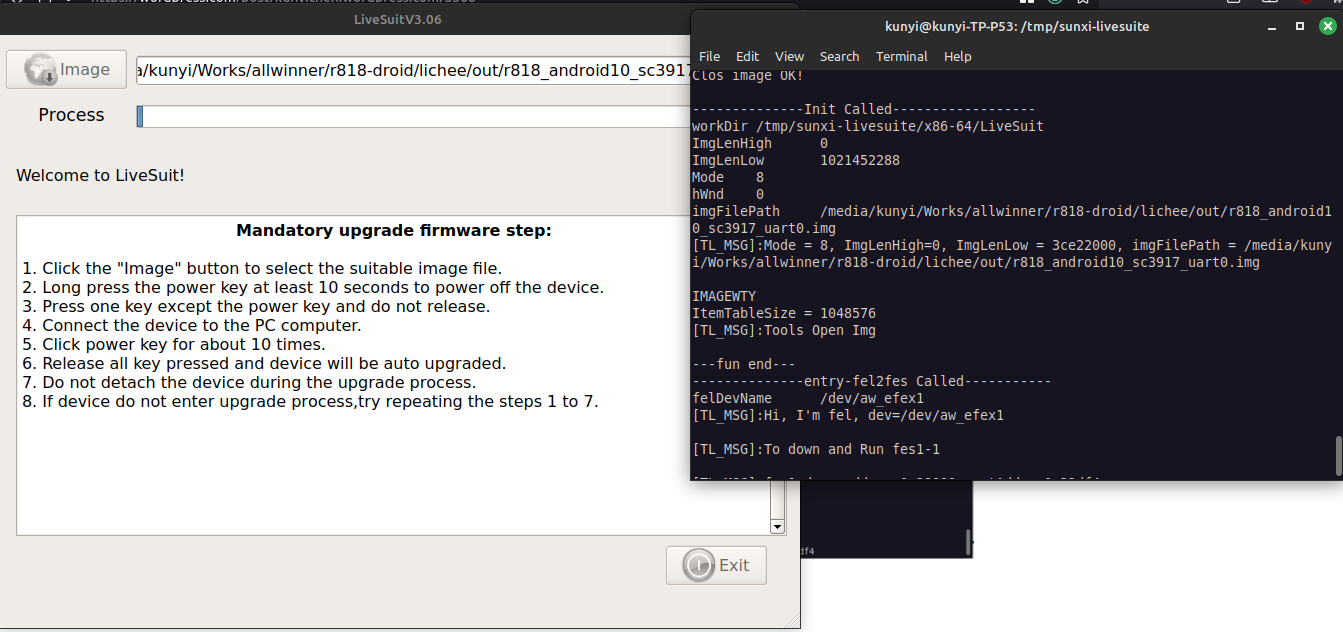
task timeout
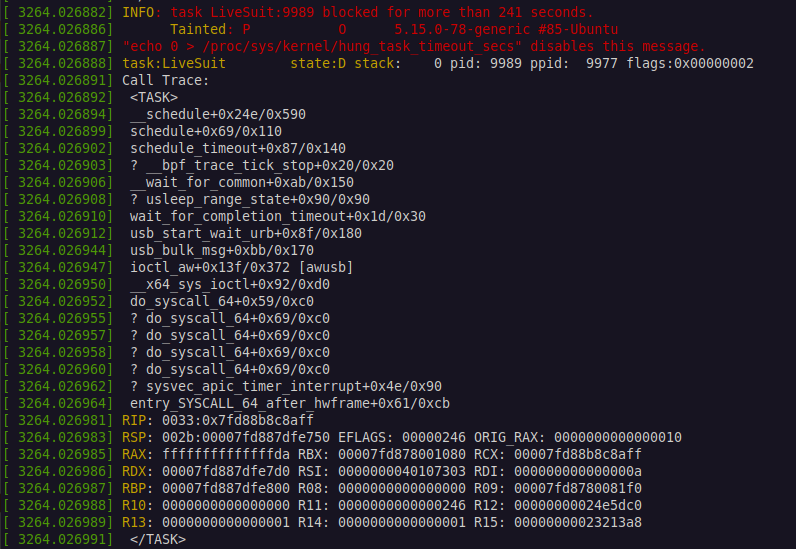
@newcastle
我自己测试 在目前Allwinner 系列上面 Ubuntu 18.04 问题最少
@lknn2012
看你的2.
simg2imag system.fex 应该是android spare to raw 就变成 ext4
应该可以用img2simg 还原才对
看看这个
https://blog.csdn.net/jingwen3699/article/details/81807024
Docker image 使用Ubuntu 18.04 当基底
目前验证D1-H NeZha Tina-Linux v2.x 编译正常
原则上应该也能编译A133
git config 要在主机 环境先设定
build docker image 会直接使用它
Dockerfile 內容
FROM ubuntu:18.04
ARG userid
ARG groupid
ARG username
RUN apt-get update && apt-get install -y \
build-essential cvs subversion mercurial git-core \
libncurses5-dev zlib1g-dev gawk flex quilt openssl libssl-dev \
xsltproc libxml-parser-perl bzr ecj unzip \
lib32z1 lib32z1-dev libc6-i386 lib32ncurses5 \
lib32stdc++6 libstdc++6 rsync vim wget curl bc busybox \
linux-tools-common gperf && \
apt-get clean && \
rm -rf /var/lib/apt/lists/* /tmp/* /var/tmp/*
RUN curl -o /usr/local/bin/repo https://storage.googleapis.com/git-repo-downloads/repo \
&& chmod a+x /usr/local/bin/repo
RUN groupadd -g $groupid $username \
&& useradd -m -u $userid -g $groupid $username \
&& echo $username >/root/username \
&& echo "export USER="$username >>/home/$username/.gitconfig
COPY gitconfig /home/$username/.gitconfig
RUN chown $userid:$groupid /home/$username/.gitconfig
ENV HOME=/home/$username
ENV USER=$username
ENV WORKFOLDER=/home/$username
ENTRYPOINT chroot --userspec=$(cat /root/username):$(cat /root/username) / /bin/bash -c "cd $WORKFOLDER && exec /bin/bash -i"
编译这个Dockerfile 我使用下面指令
#!/bin/bash
cp ~/.gitconfig ./gitconfig
docker build --build-arg userid=$(id -u) --build-arg groupid=$(id -g) --build-arg username=$(id -un) --tag allwinner-tina:latest .
然后在下载好的源代码目录建立一个执行的 script 叫做 entrycontainer.sh
内容如下
#!/bin/bash
WORKSPACE=$PWD
docker run --privileged \
--interactive \
--tty \
--rm \
--volume=/tmp:/tmp \
--volume=${WORKSPACE}:/tina \
--env WORKFOLDER=/tina \
--hostname tina-build \
allwinner-tina:latest
使用方式如下图
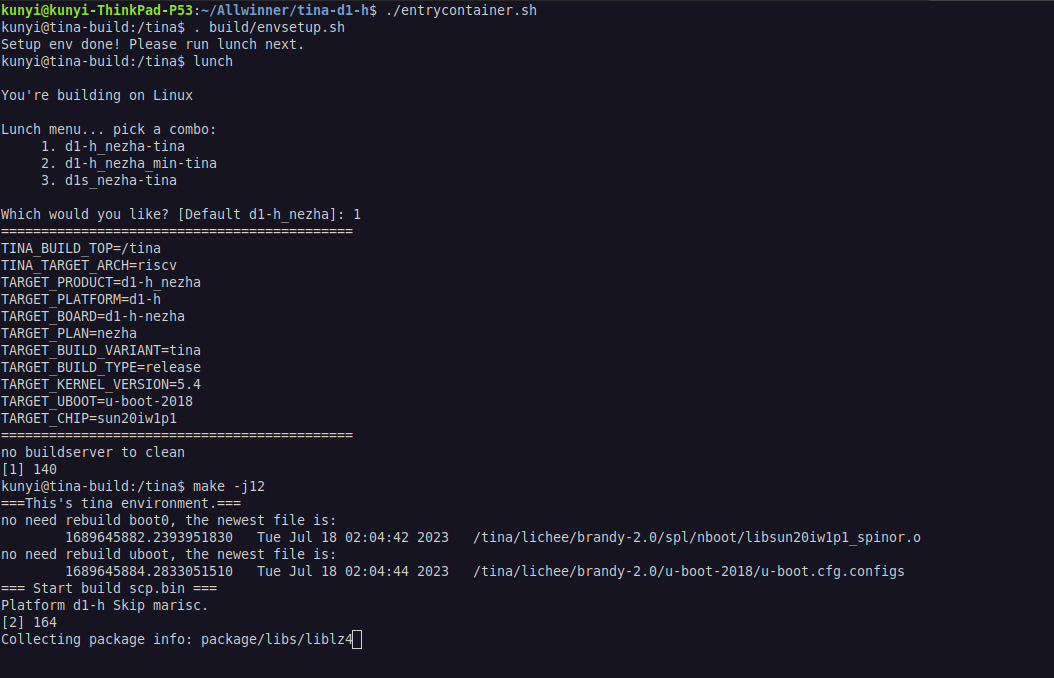

有没有人有 A133 的 GMAC 跟RTL8363NB 之间的原理图
目前看 A133/R818 一般接 RTL8112F,
RTL8112F 有输出125MHz给 A133 PH3/RGM0_CLKIN
但是RTL8363NB 没有这个125MHz 只有RX/TX Clock 这样可以用吗?